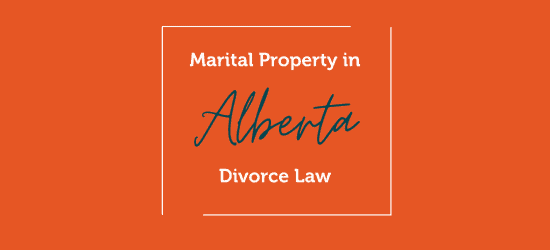Marital Property in Alberta Divorce Law

March 3rd, 2021
Marital Property in Alberta Divorce Law
As a marriage evolves, it is inevitable that the partners will accumulate assets. But what happens when the marriage dissolves? Which assets are relevant for the purposes of distribution and how do you know who gets what? In Alberta Divorce Law, the Courts will apply the Family Property Act to divide the assets between the parties.
There are several different types of assets that are relevant to family law:
- Matrimonial Property. In Alberta, matrimonial property refers to all of the assets and debts that have been accumulated – by either spouse – during the marriage. It also includes anything after the couple separates. For example, vehicles, household goods and credit cards are all considered matrimonial property. In the event of a divorce, the value of the matrimonial property will typically be split evenly between the parties, unless this division would result in unfairness to one party.
- Matrimonial Home. Typically, the matrimonial home will be the asset of greatest monetary value in a marriage. Property such as a house, condominium or mobile home, are all eligible homes. To be considered under the Alberta Family Property Act, the property must:
- be located in Alberta;
- either leased or owned by one or both parties;
- have been occupied by the parties at some point in time during their marriage for the purpose of using the home as their family home (so a vacation home would not be included here).
- Exempt Property. In Alberta, exempt property refers to the assets or debts that were acquired by one of the parties – prior to the marriage or received as a gift/inheritance/settlement from a third party during the marriage. In the event of a divorce, this exempt property will not be divided between the parties.
Other forms of exempt property can exist if there is a prenuptial or postnuptial agreement in place that protects certain assets from division.
- Increase in Value of Exempt Property. As mentioned above, exempt property does not need to be divided between the parties in the event of a divorce. However, if the value of such exempt property increases during the marriage, that value of increase would be equally divided between the parties. Factors that the Court will consider when determining how a just and equitable division of this increase will be divided, include:
- the financial situation of both parties;
- any agreements the parties made;
- what each spouse contributed to the marriage;
- how long the marriage lasted;
- when the property was acquired;
- whether either spouse have tax liabilities;
- whether there are Court orders against either spouse.
Throughout your marriage, you have likely accumulated assets. These assets will comprise more than just your house – it will also include investments, pensions, cars, bank accounts, household goods, business assets and much more. Going through your divorce with the help of an experienced Calgary divorce lawyer will help ensure you have thoroughly covered all of the various assets that are subject to division.
Contact us today to learn more.
